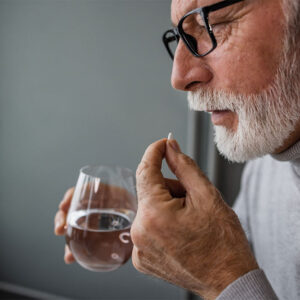
How to Avoid the Leading Cause of Blindness
It’s one of the saddest phenomenons I’ve faced in my 35 years of practice: Conditions that were once expected to strike in “old age” are now affecting younger and younger people.
Macular degeneration is a prime example.
This eye condition is the leading cause of blindness in the U.S., and it is typically associated with aging.
But in more recent years, it has started to show up in people as young as 15-25.
Since macular degeneration is considered incurable, most doctors will put you on drugs and tell you to hope for the best.
If you ask me, these doctors are suffering from their own form of blindness.
Because the cause of this increase is right in front of their faces. Better still—the answer is staring them in the face as well.
The biggest factor contributing to macular degeneration is blue light.
That’s the kind of light emitted by the screens so many people are glued to today… phones, computers, tablets, TVs.
It’s true that the sun emits blue light, and it is essential for things like alertness, memory, and mood.
But with this wavelength pouring out of every device with a screen 24/7, we’re on blue light overload. And studies have shown that overexposure can damage light-sensitive cells in the retina.
Permanently.
The problem is a major one, but the answer here is simple: Avoid fake blue light as much as possible.
I recommend downloading blue-light blocking apps or purchasing films to put over the screens themselves that will cut out the blue light after the sun goes down.
Or you could do what I do, and wear blue-light blocking glasses at night.
In addition, whether you’re 15, 55, or 90, you should consider increasing specific eye-protective nutrients.
Here are my top 4.
Vitamin C helps protect vision by helping the body absorb more of the nutrients it needs and by protecting against free radical damage.
Lutein is one of the few carotenoids that get absorbed into the eye itself. Studies show that taking just 6 milligrams a day reduces the risk of macular degeneration by 43%.
Zeaxanthin is a close cousin of lutein, and it is especially good at protecting the eye from UV rays, inflammation, and importantly, blue light.
Vitamin E. Studies show that people who consume the most vitamin E and lutein have the lowest risk of macular degeneration. And taking the combination of vitamins E, C, and A reduces the risk of developing macular degeneration by 25%
To a brighter day,
Dr. Richard Gerhauser, M.D.
Written By Dr. Richard Gerhauser, M.D.
For years he’s been the trusted doctor for celebrities, world-class athletes, and countless seniors looking to reclaim their health.
And now…for the first time ever… he’s making his medical breakthroughs available to readers all across America.
Dr. Richard Gerhauser, M.D. is one of the most pioneering and innovative minds in medicine today – and he delivers cutting-edge cures each month through his Natural Health Response newsletter.
Natural Health Response readers get full access to Dr. Gerhauser’s protocols for chronic pain… heart disease… diabetes… Alzheimer’s… and even cancer. These are the very same treatments Dr. Gerhauser recommends to his own patients at his practice in Tucson, Arizona.
In addition to being a board-certified medical doctor, Dr. Gerhauser has earned two master’s degrees and has served as a clinical professor at the University of Arizona.
And as a physician at the world-famous Canyon Ranch, Dr. Gerhauser treated celebrities from around the world who paid dearly for the type of next-generation health information he provides Natural Health Response readers each month.
View More Free Articles
Mother Nature's Bone-Building Secret REVEALED
Mainstream medicine has peddled the same old song and dance about osteoporosis for years. Pop some calcium pills… do some jumping jacks… and cross your fingers that your bones don’t crumble like a stale cookie. But what if I told you Mother Nature has been hiding a bone-building secret right under our noses? And we […]
The INCREDIBLE Payoff for Delaying Diabetes
If you don’t know where your blood sugar levels stand, it’s time to get them checked. It’s estimated that one in three adults has prediabetes, yet 80 percent of these folks have NO IDEA they’re in this category. That’s a BIG problem because most people will develop type 2 diabetes within just five years of […]
The Biggest Dementia Risk Factor REVEALED
I’m sure you’re familiar with the Skeleton Dance song… “The foot bone is connected to the leg bone. The leg bone is connected to the knee bone…” It’s easy to think of our bones being linked because we can physically see them. What’s less obvious is that everything else about your health is JUST as […]
It's NEVER Too Late to Kick This Dangerous Habit
You’ve heard it a million times before: “Smoking is bad for you.” If you’re still lighting up, I bet you remember a time when smoking wasn’t just accepted—it was downright fashionable. Remember when you could smoke in restaurants, on airplanes, and even in hospitals? Heck, movie stars even made it look cool and sophisticated. Well, […]
The TRUTH About ED No One's Talking About
It’s a subject most men would rather sweep under the rug… erectile dysfunction (ED). But you’re not alone if you’re having trouble in the bedroom. In fact, ED affects up to 30 million men in the U.S. alone. However, popping a little blue pill isn’t the answer. ED drugs are often just slapping a Band-Aid […]
Don’t Let Muscle Loss RUIN Your Golden Years
For older women, muscle mass can take a nosedive after menopause. This means more than trouble carrying in the groceries. Over time, the decline in muscle mass can lead to mobility problems, balance problems, falls, and ultimately a loss of independence. Staying active is a critical piece of the puzzle. But now, researchers have discovered […]
The Bad Habit Causing Lupus
All autoimmune diseases are on the rise—but lupus is one of the worst. When the condition strikes, your immune system starts to attack healthy tissues. Lupus cases have increased by 60 percent in women and have increased six-fold in men over the past four decades. What’s driving this dramatic increase? Well, we might have found […]
SHOCKING Missing Piece of the Diabetes Puzzle Discovered
I’ve been saying for years that there’s MORE to type 2 diabetes than your weight—or even your diet. Sure, they play their part. But unless you’re adding in THIS missing piece of the puzzle, you could be increasing your risk of type 2 diabetes despite your best efforts to avoid it. And you’ll never guess […]
Ditch the Chips and DEFY Aging
Sometimes, you just want something to crunch on. The craving can send even the most health-conscious among us heading straight to the snack aisle. But before you reach for the potato chips—which can contain all kinds of harmful ingredients—I have a better idea. Try THIS crunchy, healthy snack instead of loading up ingredients that can […]
Is Aspirin DEADLY? (Get the Truth Here)
Old habits die hard… especially when we’ve been led to believe they’re good ones. We were told for years that taking an aspirin a day would lower the risk of heart attack and stroke. But for many, those were empty promises that came with a LOT of risk… and LITTLE reward. That’s why, if you’re […]










